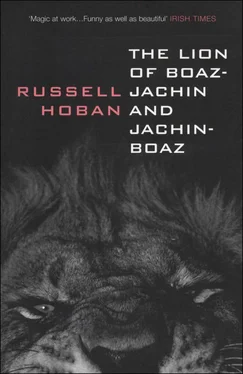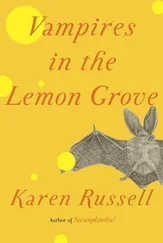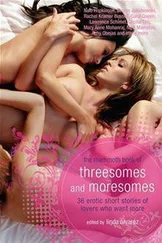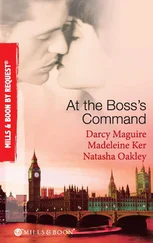‘Twelve pounds,’ said Jachin-Boaz.
Well, actually that included the bones, she said. The meat in such a joint might be six or seven pounds.
How long could a lion … tiger, he meant to say, go without food?
Another absence from the phone. Five to seven days, she said on her return. Tigers in a wild state might consume forty to sixty pounds at one time, then go hungry for a week. Certainly one could say that they were able to go without eating for five to seven days.
Where did they buy the meat for the tigers?
They bought condemned meat, he was told, and was given the name of the butchers who sold it.
Condemned meat! thought Jachin-Boaz after he had rung off. The thought made him uncomfortable. Condemned meat, no. He would economize somewhere else.
Then he became preoccupied with the wheel again. He saw his life as the wheel’s track printed on the desert, left behind by that inexorable and monstrous onward rolling. He wanted to make the lion understand that the wheel that forever bore the unscathed king away from him bore the king away from himself as well. However many wheels there were, there was in reality only one wheel. The wheel on the cage-wagon that brought the lion to the place of his death was the chariot wheel that hurried the king to his own death farther on its track. There was only one wheel, and nothing and no one had power against it.
Jachin-Boaz took another copy of the art book from the stockroom and looked at it several times during the afternoon. Often he was on the verge of weeping. He wanted to buy the book, but thought of the cost of beefsteak and borrowed it instead. When the shop closed he hurried home with the book, stopping on the way to buy meat.
At the butcher’s he looked at the carcases hanging on hooks, stared at their nakedness.
All evening he sat at his desk, silent with the book before him, looking at the picture of the lion biting the wheel. Gretel had come to know his moods by now and was accustomed to them. She did not ask Jachin-Boaz why he had particular expressions on his face at certain times.
He knew that he would go out to meet the lion before dawn. He felt like a condemned man, and was surprised to find that he wanted to make love. There were times when it seemed to him that the different parts of him were not all under the same management.
Afterwards he lay looking at the glow in the night sky over the city. He fell asleep, dreamed that he was running on an enormous master-map with the bronze-studded tyre of the chariot wheel rolling behind him, scraping his back, tearing flesh from his back as it pursued him.
At half-past four he woke up remembering nothing of his dream, bathed, shaved, dressed, and went out carrying the meat for the lion.
Jachin-Boaz saw the lion as soon as he came out of the building. He was lying on the pavement across the street, the light from the overhead lamp making harsh black shadows under the frowning brows.
He knows now that I know who he is, thought Jachin-Boaz. We are countrymen. Jachin-Boaz’s legs became weak, and there was coldness in the pit of his stomach. He wanted and did not want to go towards the lion, and he felt his body advancing while his mind sat like a passenger inside his head, looking out thorugh his eyes and seeing the lion grow larger as the distance between them lessened.
The lighted red telephone kiosk was only a few yards to his left, and he moved in that direction as he walked diagonally towards the lion. When the telephone kiosk was ten feet away and the lion was twenty feet in front of him Jachin-Boaz stopped. Again he smelled the hot sun, the dry wind, the lion-smell.
The lion got slowly to his feet, stood watching him. He was thin, Jachin-Boaz saw.
Jachin-Boaz moved forward a little farther, threw the meat to the lion. The lion pounced, tore at the meat as he held it between his paws, ate it quickly, growling. He licked his chops, looked at Jachin-Boaz, his eyes like steady green fires.
‘Lion,’ Jachin-Boaz heard himself say, ‘we are countrymen, you and I.’ His voice seemed loud in the empty street. He looked up at the dark windows of the flats behind the lion. ‘Lion,’ he said, ‘you have come out of the darkness into which the wheel took you. What do you want?’
For answer his mind showed him lion-coloured desert, singing silence in the heat of the sun, taloned sunlight opening endlessly in the eyes of his mind, lion-sunlight, golden rage, blackness.
‘Lion,’ said Jachin-Boaz. He was humbled by the lion-feeling his mind had given him, he was dominated by the lion’s commanding presence, found it difficult to go on. ‘Lion,’ he said, ‘who am I that I should speak to you? You are a king among lions, I see that plainly. I am not a king among men. I am not your equal.’ While he spoke he watched the lion’s face, his feet, his tail. He kept his eyes on the lighted telephone kiosk and edged a little closer to it.
‘But it is you, lion, who have sought me out,’ he continued. ‘I did not seek you.’ He paused as he heard himself say that. The lion had come out of the wheel’s turning darkness. Had not he, Jachin-Boaz, entered that darkness, seeking with his map?
The sky was paling quickly. As on the first morning, a crow flapped slowly overhead, settled on a chimney pot. Perhaps the same crow. Jachin-Boaz, thinking of the turning darkness from which the lion had come, wanted to close his eyes and enter it, but was afraid to.
Then words imprinted themselves on his mind, large, powerful, compelling belief and respect like the saying of a god in capital letters:
TO CLOSE ONE’S EYES IN THE PRESENCE OF A LION
He felt, as in a dream, the layered meanings of the words that stood upright in his mind as if carved in the stone of a temple.
Jachin-Boaz closed his eyes, felt the darkness slowly rise up in him, felt its turning endlessly revolving through him, rested on its constant motion. He saw sunlight in his mind again, rich patterns of colour mottled with falling gold, sunlight as on oriental carpets.
He remembered the darkness with a smile. Yes, he thought comfortably in the sunlight, turning always. One way. No way back. The blackness surged up through the sunlight, bright with terror, snaky, brilliant. One way. No way back. I shall cease to exist at any moment, he thought. No more world. No more me.
He dropped through blackness, sank through time to green-lit ooze and primal salt, to green light through the reeds. Being, he sensed, is. Goes on. Trust in being. He rested there, prostrate in his mind, awaiting his ascent.
From the green light and the salt he rose, opened his eyes. The lion had not moved.
‘My lord Lion,’ said Jachin-Boaz. ‘I trust in being. I trust in you. I fear you and I am glad that you exist. Respectfully I speak to you, and who am I that I should speak?
‘I am Jachin-Boaz, trader in maps, maker of maps. I am the son of Boaz-Jachin, trader in maps before me. I am the father of Boaz-Jachin, who now sits in the shop where I have left him. He has no love for maps, I think, and none perhaps for me.
‘Who am I? My father in his coffin lay with his beard pointing like a cannon from his chin. While he lived he praised me and expected much of me. From my early childhood I drew maps of clarity and beauty, much admired. My father and my mother wanted great things from me. For me. Wanted great things for me. Which of course I wanted also.’ Jachin-Boaz felt a tightening in his throat — a sound, formed and ready and aching for utterance, a high-pitched single note, a wordless plea. ‘Aaaaaaaaaaa-aaaaaaaaa,’ he sounded it, a naked, wanting sound. The lion’s ears went back.
‘They wanted,’ said Jachin-Boaz. ‘I wanted. Two warnings. Not the same. No. Not the same.’
The lion crouched quietly, the green-fire eyes fixed always on Jachin-Boaz’s face.
Читать дальше












